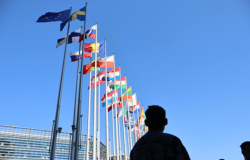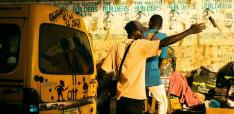Aspirations of young people from the Roma community and the need for decolonization (in) education in the Polish context

This is the twelfth chapter in a forthcoming e-book, entitled 'Decolonial Education and Youth Aspirations'. Urszula Markowska-Manista and Sonia Styrkacz call for Roma activism in the struggle for rights and decolonisation.
Roma activism is a key element in the struggle for rights and decolonisation of narratives about the Roma community, whose situation varies across time and place, and is directly conditioned by culture, social situations and historical contexts. This chapter examines the practices of Roma activism, exploring the reasons why it is undervalued and highlights the potential of activism in inspiring young Roma to take action. Additionally, it includes autoethnographic reflections on personal experiences of the phenomenon.
Roma activism is an important part of the struggle for equality, social justice and decolonisation of historical narratives. However, in educational spaces, academia and mainstream discourse, it is often trivialised and paternalised (Trehan & Kóczé, 2009). The dominant narrative ‘about them, without them’ reveals the difficulties the Roma face in attempting to break through the glass ceiling of the societies they are part of and of social, political and academic discourses. Our aim, therefore, is not only to illuminate some of the reasons for this approach, but also to show how Roma activism can contribute to positive change, especially in the context of young Roma's aspirations. Through autoethnographic reflections, we show how the personal experiences of people from the community and from mainstream society, confirm these phenomena. We also highlight the importance of activism as a decolonising practice and inspiration for young Roma, referring to examples of useful practices and social movements.
Life context of Roma youth in Poland: a conceptual framework
In this section, we analyse the situation of Roma youth, based on desk research and an analysis of prevailing discourses which, though in many cases concern the Roma, often neglect their direct voice. Speaking ‘about the Roma’, ‘exploring the situation of the Roma’ without the Roma themselves, means that the challenges they face, resulting from marginalisation and discrimination, e.g. in school education, are articulated in the language of the mainstream and from the position of mainstream society. Research ‘about the Roma’, conducted without their active participation, leads to the reproduction of the challenges that the Roma community faces on a daily basis, especially in the context of education. Discourses held from the position of mainstream society reproduce inequalities and are mechanisms of exclusion. The Roma are often treated as a ‘problem to be solved’ rather than as partners in dialogue. As a consequence, they are alienated and mistrustful of public and academic institutions.
The lack of adequate recognition and support from academic institutions hinders the development of Roma activism and limits its impact. This undervaluation of Roma activism in the academy is due to several factors. Firstly, there is a deep-rooted racism and prejudice against the Roma in societies that affects how they are perceived. Secondly, the Roma's absence in academia means that their perspective is often overlooked (Surdu & Kovats, 2015). Furthermore, dominant academic narratives are often based on Eurocentric and colonialist assumptions that marginalise the experiences of ethnic minorities (Kóczé, 2018). This leads to a situation in which Roma activism is treated as less important or unworthy of serious research.The paternalistic approach towards the Roma often takes the form of imposing externally designed solutions without adequate consultation or understanding of their specific needs. Although such measures may sometimes be intended to provide support, research shows that they frequently overlook lived realities, risk sustaining structures of dependency, and contribute to maintaining social division (Matache, 2017). The absence of inclusive and substantial knowledge of the Roma community almost certainly ensures that policymaking will continue to rely on partial, biased, or externally imposed narratives. Academic research that recognises Roma voices and experiences can provide the evidentiary basis for more context-sensitive interventions and can serve as a tool for Roma activists and civil society to hold institutions accountable.
The need for decolonization (in) education - voices from within and outside the community
The aforementioned challenges are not limited to public discourse but, as alluded to earlier, also extend into higher education. Universities and academic institutions may unintentionally reproduce exclusionary practices that reflect wider societal stereotypes. In this context, the personal testimonies of Roma academics and activists offer valuable insights into how these dynamics play out in practice.
“I have repeatedly encountered situations in which my activities have been viewed dismissively or ignored by the academic community. At academic conferences, Roma voices were sometimes disregarded in favour of the voice of ‘experts’ from outside the community, who often presented simplistic or erroneous interpretations of our problems. My own experience in the Polish academy supports these observations.On more than one occasion, I was dismissed to the role of ‘just’ an activist, despite having research and academic experience. I myself have been treated as a person driven solely by emotions and not by knowledge. This disempowerment and belittling is not only frustrating but also demotivating for many Roma wishing to engage in academic and social activities. The Roma face numerous barriers to accessing higher education and academic careers.” (Sonia)
Studying one's own community involves a number of social roles that require reflection and a critical approach (Smith, 2012). On one hand, one may be tempted to abandon community identity in favour of academic objectivity. On the other hand, the Roma perspective is crucial to understanding community experiences that have been historically overlooked in academic discourse. One example of the ‘glass ceiling’ can be seen in the lack of representation, prejudice and structural inequalities. Even those Roma who manage to enter the academic world often face marginalisation and lack of support.
In 2017, I invited some of my Roma friends as guests to a class (an intercultural workshop) at one of the pedagogical universities. The ladies came with their children and were wearing colourful dresses. When they entered the room, the students sitting in a semi-circle automatically rose from their chairs and took a step back. There was silence and consternation. Later, the students apologised, very ashamed of how they had reacted (automatism, stereotype). They also confessed that it was their first opportunity to talk and exchange information with people from the Roma community, even though some of them live next door.(Urszula)
These testimonies reveal how Roma voices can be dismissed or treated as less legitimate, discouraging participation and further limiting access to higher education and academic careers. Including such reflections underscores that the decolonisation of education is needed not only in schools but also within universities.
Roma activism in action
Roma organisations and individual activists engage in campaigns to combat discrimination, promote Roma culture and strengthen community identity (Matache, 2016). Organisations such as the European Roma Rights Centre (ERRC) have campaigned for decades against systemic violations of Roma rights across Europe, highlighting persistent inequalities and pressing for institutional accountability. Yet, despite their scope and importance, Roma activists and organisations continue to face constraints due to a lack of institutional and social support.
Roma activism can be understood not only as a form of protest, but also as a significant tool for decolonising knowledge and social practices. Through active participation in public and academic discourse, the Roma challenge dominant narratives and introduce a perspective based on their own experiences. This allows them to redefine Roma identity and regain control over their own history and culture. Through direct engagement, activists can better understand the needs and aspirations of the people they work with.
One example is the ‘Let's get to know each other’ social campaign. Organised by the Foundation Towards Dialogue, the initiative is part of a broader trend of anti-discrimination activities that seek to build a more inclusive society by increasing the visibility of marginalised groups.
The campaign uses personal narratives to break down barriers and increase understanding. Among the protagonists of the campaign are: Krzysztof Gil, an artist and university lecturer from Kraków; Lucyna Styrkacz, a saleswoman from Chorzów; Delfin Łakatosz, a filmmaker from Poznań; Rada Sorochymska, a social organisation worker from Ukraine; Monika Paloma Adler, an integration assistant from Przemyśl; Dawid Huczko, an aid worker for the refugee community from Ukraine; and Agata Róża Łakatosz, a poet and dancer from Poznań. Each of these individuals represents a different facet of the Roma community, reflecting its inherent diversity and desire for dialogue. Through its authenticity and focus on personal stories, the initiative has the potential to contribute to the deconstruction of harmful stereotypes and promote intercultural understanding. It should be adapted to local historical and cultural contexts and become a lens that allows us to combat prejudices and establish new thinking patterns (Górak-Sosnowska & Manista-Markowska, 2022).
Art is another form of activism clearly showing how the image of the Roma in and through art has evolved since Roma artists took control of narrative construction. Some examples include the work of Krzystof Gil, reclaiming the narratives of Romaniness, or the work of Małgorzata Mirga-Tas demonstrating the potential and power of ‘herstory’ - Romani women - and the uniqueness of the message disenchanting stereotypical narratives about the Roma, through art projects countering exclusion, racial discrimination and xenophobia.
For young Roma, activism is a source of inspiration and a way to build identity. The DIKH HE NA BISTER (‘Look and don't forget’ in Romani) initiative plays a key role in strengthening the identities of young Roma and Sinti by engaging them in historical memory and building their own narrative. Focusing on the annual European Roma and Sinti Holocaust Memorial Day on 2 August, the initiative not only commemorates the victims of the genocide but also creates a space for young people to rediscover their identity and position in European society. Strengthening identity through historical and educational activism is achieved here on several levels. First and foremost, the initiative offers young Roma the opportunity to meet witnesses of the Holocaust, whose testimonies not only make participants aware of the scale of the persecution their community was subjected to, but also inspire them to combat contemporary anti-Gypsyism and racism.
This is a crucial element in the process of regaining control of one's own history and building a sense of pride in one's own identity, which is important in the context of the long-standing marginalisation of the Roma. The DIKH HE NA BISTER campaign enables young Roma to write their own history and is an example of collective memory activism that strengthens their historical and identity awareness. By referencing the experiences of the past, the initiative helps young people to empower themselves in the modern world, facilitating the articulation of their needs and the struggle for rights. Another important aspect of the campaign is the establishment of 2 August as European Roma and Sinti Holocaust Remembrance Day, which was formally recognised by the European Parliament in 2015. This achievement symbolises the contribution of young Roma to the recognition of their history and tragedy.
The initiative has also a mobilising dimension, as it brings together thousands of young Roma and non-Roma people from all over Europe every year. An example from 2014, when more than 1,000 young people from 25 countries gathered in Krakow and Auschwitz-Birkenau, testifies to its great importance in strengthening intercultural solidarity. However, DIKH HE NA BISTER is not limited to one-off events. Commemoration initiatives also take place locally in different European countries, allowing identity awareness to develop in local communities. Participation in social and cultural initiatives allows them to develop skills, gain experience and a sense of belonging. This in turn translates into their educational and career aspirations.
Roma activism provides an opportunity to control the narrative and shape their own image. By speaking their own language and on their own terms, the Roma regain a voice in public discourse. However, such agency comes with risks. When colonisers repeatedly hear criticism of their conduct they may react defensively, ignoring the voices of the Roma community and relegating activists to the role of ‘shouters’ without any meaningful contribution. This approach is not only frustrating but also demotivating for young Roma who would like to engage with their Roma and Non-Roma community.
Despite these difficulties, Roma activism plays a key role in inspiring young Roma to act and take control of their own lives. Through the example of personal involvement, activists show that it is possible to take matters into one's own hands and pursue one's own aspirations (Ryder, Rostas, & Taba, 2014).
A call for a transformation in education within the paradigm of decolonisation
In the last part of the text, we emphasise that the decolonisation of education is a joint task of both mainstream and minority communities. It is crucial that this process is based on a multi-voiced and collaborative process that aims to transform the education system at the level of practices and policies.
In contemporary critical youth studies, young people, as a learning community, are the key actors shaping their own present and future. However, they are not in a vacuum, as their social engagement and educational opportunities and aspirations are linked to minority- and majority-directed education and the discourse in which they function on a daily basis.This means that the way we design education and discuss knowledge in society is crucial. Education systems and public debates can be inclusive – allowing for many diverse voices, experiences, and cultural perspectives – or they can be exclusive, promoting a single narrative that presents one culture as the central reference point while marginalising others. Inclusive approaches validate young people’s identities and equip them to engage critically with difference, fostering empathy, intercultural understanding, and social cohesion. Exclusive approaches, by contrast, restrict young people’s horizons and reinforce systems of inequality. This is why decolonisation in education is crucial as it disrupts the dominance of singular, nation-centric narratives and creates space for more equitable and inclusive teaching and learning.
Schooling, education and the curriculum, as well as the adults teaching at school, shape young people's thinking and often influence their choices. The content and images available in textbooks and teaching materials are also important, as the stereotypes built on them and the lack of contextual commentary can strongly distort the image of contemporary Roma. Hence the need to include decolonisation in the teaching process, understood as counteracting stereotypical, colonial patterns and practices of knowledge transmission based on power discourse (Quijano, 2000). This involves recognising that there is not one dominant narrative, but many narratives showing diversity (Markowska-Manista, 2022).
By ignoring this diversity or making it invisible through the prism of Eurocentric and nation-centric biases, many gaps and misrepresentations are created, with multiple discriminatory consequences for minorities and minority communities. In this respect, it is not enough merely to embrace cultural diversity, pluralism, equality, and social justice, but it is necessary to recognise and problematise the fact that the situation of Roma youth and their aspirations are influenced by the post-colonial educational narrative and the discursive inequality and marginalisation of Roma in the curricula. For centuries, the Roma have not had the opportunity to create their own narrative. It was the non-Roma who shaped the discourse about Roma, often perpetuating stereotypes and prejudices (Surdu & Kovats, 2015). The inclusion of Roma perspectives is therefore crucial for the decolonisation of knowledge and social practices. Roma activism and research allow us to revise existing narratives and build a more authentic image of the community.
We conclude our reflections with a call for a deconstruction of thinking about education as a hegemonic tool and the need to bring together communities of scholars and practitioners in actions that aim to promote aspiration and inclusivity. Transforming education in the spirit of decolonisation requires not only changes in curricula, teaching tools and methods, but also a critical revision of dominant voices and narratives to better reflect social complexity and diversity. The inclusion of Roma perspectives, values and experiences is a key step towards a more just and inclusive education system, and thus towards a more just society. Decolonisation ‘requires us to reinterpret how colonial encounters have long been depicted in polarised terms, prompting a re-reading of these oppositions as processes of transculturation and cultural translation that continuously unsettle simplistic divisions such as here/there’ (Hall 1996).
Recommendations and Guidance
To achieve effective discourse and practical action, it is crucial to balance mainstream narratives with those of minority groups, particularly the Roma community. This requires a critical review of school curricula to ensure they are inclusive, non-discriminatory, and human rights-based. We must avoid the single narrative that dominates, instead embracing multiple voices to enrich our understanding.
Incorporating diverse sources of knowledge promotes decolonization, allowing both mainstream and minority perspectives to flourish. Strengthening inclusive activities can help remove barriers to participation, meeting the varied needs of children and young people.
Educators should be aware of the significance of participation and non-discrimination in education. Meaningful community engagement is essential for fostering understanding and developing cooperative dialogue.
Systemic change is necessary to create policies that respond to the needs of young people, a vulnerable and culturally diverse group. Raising awareness about integration among mainstream and minority groups is vital, along with sharing effective practices and success stories to counter stereotypes and encourage a more inclusive society.
Sonia Styrkacz is a PhD candidate in pedagogy at the University of Silesia and in psychology at the University of Warsaw. She is a practicing psychologist and researcher, collaborating with mental health clinics in Poland. She is also affiliated with the Educational Research Institute (Instytut Badań Edukacyjnych), a state research institute in Poland.
Urszula Markowska-Manista is a field researcher studying education in culturally diverse environments, with a focus on humanizing methodology, childhood and youth studies concerning children’s rights in fragile contexts. She is a PhD habil., Member of the Scientific Board in Education, and a head of Interdisciplinary Research Center for Intercultural Education and Communication at the University of Warsaw.
Image Authors' Own: Flags outside the European Parliament, by Lucyna Styrkacz – a young Romani woman participating in a project for Romani leaders – on a study visit.
Roma Youth Leadership School
This film, created by Delfin Łakatosz - a young Roma filmmaker and active participant in the project - documents the first two sessions of the Roma Youth Leadership School. It features short interviews with young Roma participants and the project team. Their voices carry a message to the Council of Europe and the European Parliament - a call to recognise the ambitions, potential, and needs of young Roma people in the European Union.
The aim of the video is to highlight the situation of Roma youth across Europe, particularly in Poland and Slovakia. It is an appeal for equal opportunities, access to education, and active participation in public life. The project is part of the Erasmus+ program (KA153-YOU), and is a joint initiative of the Dom Kultury Foundation and ETP Slovensko. It creates space for developing leadership, awareness of rights, responsibilities, and opportunities as EU citizens.


